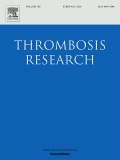 Thrombosis Research has removed an abstract after all seven authors authors listed did not know that it had been submitted for publication.
Thrombosis Research has removed an abstract after all seven authors authors listed did not know that it had been submitted for publication.
We’ve seen many instances of some authors not being in on a submission, but a case in which all of the authors are in the dark? That’s new to us.
A spokesperson for Elsevier, the journal’s publisher, told us that the organizers of a conference submitted it to the journal as part of a supplement for a meeting, unbeknownst to the authors.
Here’s the odd “removal notice” for “The Characterisation of the Age-Specific Differences in Platelet Physiology and Function:”
This abstract has been removed at the request of C. Yip, V. Ignjatovic, C. Attard, V. Karlaftis, M. Linden, P. Monagle, P. Jimenez-Fonseca, who indicate that they had nothing to do with this abstract and were unaware of its submission.
The story is a little more straightforward than the retraction note makes it sound.
Vera Ignjatovic, one of the accidental authors and based at the Murdoch Childrens Research Institute in Australia, told us:
We learnt about the [publication] whilst performing a PubMed search.
She confirmed to us that the authors did, in fact, submit a similar abstract to a conference:
We submitted an abstract but withdrew it as none of us could make it to the conference.
Ignjatovic is on leave from work for unrelated reasons, however, and said she couldn’t confirm that the abstract that ended up in the journal was exactly the same:
From memory it largely matches our abstract. I don’t have both documents available to me while on leave and can’t confirm this at the moment.
There’s another mysterious aspect to this story: Ignjatovic told us that the work was published with five authors she knew,
and a name of an additional author (senior author on the publication), whom none of us knew. This publication happened without our authorisation.
P. Jimenez-Fonseca was listed as the senior author on the abstract. We have been unable to find contact information for that author.
We regularly see papers submitted without the permission of some of the authors, like a p53 paper that Molecular Carcinogenesis retracted in the fall; we’ve even seen a case where the corresponding author wasn’t aware that a fellow researcher submitted a paper to the Journal of Micromechanics and Microengineering.
The retracted abstract has been cited once — by the retraction note — according to Thomson Reuters Web of Science.
Like Retraction Watch? Consider making a tax-deductible contribution to support our growth. You can also follow us on Twitter, like us on Facebook, add us to your RSS reader, sign up on our homepage for an email every time there’s a new post, or subscribe to our new daily digest. Click here to review our Comments Policy. For a sneak peek at what we’re working on, click here.
In my (limited) experience, conference “call for papers/abstracts” can be very vague about how or where abstracts will be made available and/or published. If you’re required to sign copyright over to the conference organisers as part of the submission, it’s definitely possible for them to subsequently assign copyright to a journal without the authors knowing. I also know colleagues who’ve discovered abstracts from long-forgotten conferences, published in supplements or special issues – though they admitted to not really reading the copyright assignment before signing it.
I had a somewhat similar experience in 2012: the call for papers said *selected* abstracts *may* be published in Journal A, but the conference organisers subsequently made a deal to publish *all* abstracts in Journal B. And so low and behold, I ended up with a published abstract in Journal B, and this was all technically OK based on the copyright I’d assigned.